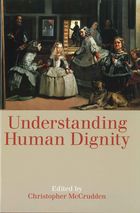Understanding Human Dignity

Understanding Human Dignity
Christopher McCrudden, ed.
Oxford University Press, November 2013
- Outstanding calibre of contributors to the volume, including Baroness Hale of Richmond and the Archbishop of Westminster, Vincent Nichols
- International team of contributors from UK, USA and Europe
- Includes a section on application of theory to current political debates, e.g. abortion, same-sex marriage, socio-economic rights, religious freedom and animal rights
Understanding Human Dignity aims to help the reader make sense of current debates about the meaning and implications of the idea of human dignity. The concept of human dignity has probably never been so omnipresent in everyday speech, or so deeply embedded in political and legal discourse. In debates on torture, abortion, same-sex marriage, and welfare reform, appeals to dignity are seldom hard to find. The concept of dignity is not only a prominent feature of political debate, but also, and increasingly, of legal argument. Indeed, courts tell us that human dignity is the foundation of all human rights. But the more important it is, the more contested it seems to have become. There has, as a result, been an extraordinary explosion of scholarly writing about the concept of human dignity in law, political philosophy, and theology. This book aims to reflect on these intra-disciplinary debates about dignity in law, philosophy, history, politics, and theology, through a series of edited essays from specialists in these fields, explored the contested concept in its full richness and complexity.
Readership: Scholars and postgraduate students in law, political theory and theology
Contributors:
Baroness Hale of Richmond FBA (Justice of the Supreme Court)
Vincent Nicols (Archbishop of Westminister)
Christopher McCrudden FBA (Law, Queens University Belfast/Michigan)
Rebecca Scott (History/Law, Michigan)
Christoph Goos (Law, Bonn)
Samuel Moyn (History, Columbia)
Catherine Dupré (Law, Exeter)
David Hollenbach (Theology, Boston College)
Michael Rosen (Political Theory, Harvard)
Conor Gearty FBA (Law, LSE)
Christoph Möllers (Law, Humboldt)
Bernhard Schlink (Law, Humboldt/Cardozo)
John Milbank (Theology, Nottingham)
James Hanvey (Theology, Heythrop)
Janet Soskice (Theology, Cambridge)
David Walsh (Politics, Catholic University of America)
Tina Beattie (Theology, Roehampton)
David Gushee (Theology, Mercer)
John Tasioulas (Philosophy, UCL)
Thomas Hill (Philosophy, North Carolina)
Jeremy Waldron FBA (Political Philosophy/Law, NYU/Oxford)
Roger Brownsword (Law, Kings)
Aharon Barak (Law, Herzliya)
Dieter Grimm (Law, Wissenschaftskolleg, Berlin)
Jean-Paul Costa (Law, International Institute of Human Rights, Strasbourg)
Julian Rivers (Law, Bristol)
Patrick Riordan (Political Philosophy, Heythrop)
Sergio Dellavalle (Law, Turin/Max Planck Institute, Heidelberg)
Joel Harrison (Law, Columbia)
Edwin Cameron
Christopher Tollefsen (Philosophy, South Carolina)
Robert George (Philosophy, Princeton)
Reva Siegel (Law, Yale)
David A Jones (Anscombe Bioethics Centre, Oxford)
Denise Réaume (Law, Toronto)
Clemens Sedmak (Theology, Kings)
Joseph Vining (Law, Michigan)
Matthias Mahlmann (Law, Zürich)
Paolo Carozza (Law, Notre Dame)
Gerald Neuman (Law, Harvard)
Alexandra Kemmerer (Law, Wissenschaftskolleg, Berlin)